The Rise of Electric Vehicles in Australia: A Comprehensive Analysis
The automotive industry is undergoing a transformative shift, as electric vehicles (EVs) gain prominence globally. Australia, once a stronghold of internal combustion engine (ICE) vehicles, is gradually embracing the EV revolution. This article delves into the latest EV sales data in Australia, exploring the factors driving their growth and the impact they are having on the automotive market.

Rising EV Sales
According to the latest data from the Electric Vehicle Council (EVC), EV sales in Australia surged by 80.9% in February 2024, marking the highest monthly sales figure on record. Plug-in hybrid electric vehicles (PHEVs) and battery electric vehicles (BEVs) accounted for 19% of total new vehicle sales, a significant increase from 13.6% in February 2023.

Key Drivers of EV Growth
Several factors are contributing to the rapid growth of EV sales in Australia:
* Government Incentives: The Australian government offers a range of incentives to encourage EV adoption, including tax breaks, rebates, and grants.
* Falling Battery Costs: The cost of EV batteries has been declining steadily over the past decade, making EVs more affordable for consumers.

* Improved Charging Infrastructure: The number of publicly available EV charging stations is increasing rapidly, addressing one of the key barriers to EV ownership.
* Environmental Concerns: Growing awareness of the environmental impact of ICE vehicles is motivating consumers to consider cleaner alternatives.
* Technological Advances: EVs are becoming more advanced and offer longer ranges, faster charging times, and improved performance.
Market Share by Brand
Tesla remains the dominant EV player in Australia, capturing a significant market share in both the BEV and PHEV segments. Other brands gaining traction include Hyundai, Kia, and Volkswagen. Chinese manufacturers such as BYD and MG are also making a mark in the Australian EV market.
Impact on the Automotive Market
The rise of EVs is having a profound impact on the automotive market in Australia:
* Traditional ICE Vehicles: EV sales are cannibalizing sales of traditional ICE vehicles, particularly in the compact and midsize SUV segments.
* Dealership Networks: EV showrooms are becoming more prevalent, while some traditional dealerships are transforming their operations to cater to EV buyers.
* Automotive Workforce: The transition to EVs is creating new jobs in fields such as battery technology, charging infrastructure, and EV maintenance.
* Energy Demand: The increased adoption of EVs will lead to increased demand for electricity, potentially requiring investments in grid infrastructure.
Challenges and Future Outlook
Despite the rapid growth, EV adoption in Australia still faces some challenges:
* High Purchase Prices: EVs are still generally more expensive than ICE vehicles, although government incentives can help offset this cost.
* Limited Range: Range anxiety is still a concern for some potential EV buyers, particularly in rural areas.
* Public Charging Infrastructure: While charging infrastructure is expanding, it needs to keep pace with the growing number of EVs on the road.
Despite these challenges, the future of EVs in Australia looks promising. Government support, technological advancements, and changing consumer preferences will continue to drive the adoption of EVs, leading to a greener and more sustainable transportation system in the years to come.
The rise of electric vehicles in Australia is a testament to the changing landscape of the automotive industry. Driven by government incentives, falling battery costs, and improved charging infrastructure, EVs are rapidly gaining market share. The transition to EVs is not without its challenges, but the benefits it offers in terms of environmental sustainability, reduced operating costs, and technological innovation make it an inevitable trend. As EV technology continues to advance and government support remains strong, the future of transportation in Australia is undeniably electric.
